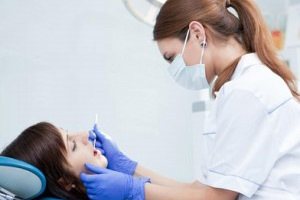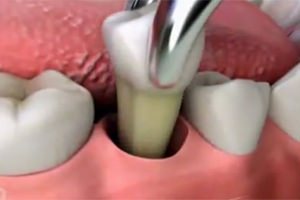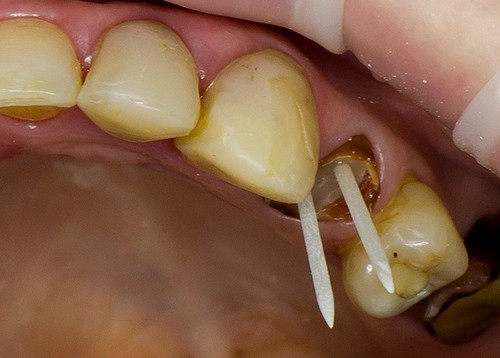Pain can last from several hours to several days after surgery. In case of their intensity and duration, your doctor may prescribe pain relievers, the intake of which begin half an hour after tooth extraction and continue at intervals of six hours.
How many sore gums after tooth extraction?
Swelling of the gums after surgery is a typical phenomenon of post-traumatic local inflammatory process that develops during the mechanical tissue damage.
What to do when swollen gums after tooth extraction?
Swelling may go to the masseter muscle is a complication usually resolves on its own, but if after 4 days no improvement has occurred, you must contact your doctor.
How to heal gums and the hole after tooth extraction?
Hole in place of an extracted tooth brings discomfort during the healing process – it can get leftover food, it can bleed and hurt. Moreover, it is necessary to carefully monitor her condition, observing all the rules of hygiene and care to avoid suppuration and inflammation, alveolitis.

Immediately after removing the tooth in its place formed a blood clot, which plays an important role in the process of wound healing. It prevents bacteria and does not hide in the hole food particles. That is why picking the wound with your fingers, a toothpick, a language is strictly contraindicated to prevent blood clot, as it is fraught with complications in the form of dry socket or alveolitis.
Gradually, as the healing blood clot is replaced by granulation tissue, which, in turn, is replaced by osteoid. Thus, in the place where once was a tooth, the formation of new bone, over which the gums.
In the first phase of tissue repair circular ligament surrounding the tooth, is contracted, bringing together the edges of the gums to each other. This process is called secondary intention, and its success largely depends on the quality of the operation. If the tooth was badly damaged and smashed the surrounding tissue, the wound is long delayed and difficult.
So, normally the gum margin converge after about 2-3 weeks, and despite the traumatic operation, this process is delayed for a month or two. In the case of complications complete healing process takes four to six months.
How long does the swelling after tooth extraction?
Slight swelling after tooth extraction is a normal phenomenon, because surgery causes local inflammation and swelling and redness of the tissues are characteristics. Local inflammation appears in violation of the integrity of the gums, without which to remove the tooth impossible. Danger is a situation in which the swelling does not subside in a week, and gradually increased, affecting the area of the cheeks and chin.
If a properly performed surgery without complications swelling lasts no more than 4 days, and completely disappears in a week. In the absence of improvements necessary to consult a specialist.
However, if swelling after tooth removal is not reduced or, on the contrary, increases, moving to the cheek or chin, you should definitely consult a doctor as it may indicate the development of infectious-inflammatory complications.
How to relieve swelling after tooth extraction?
A small swelling of the cheeks in place of the projection of the extracted tooth is found in many patients and does not pose a threat to health. However, it is important to independently control the size of the edema and record the slightest changes. Swelling usually subsides within a day after the operation and does not require additional measures for its elimination. In order to prevent complications several times a day to take pictures to compare the size of swelling and the dynamics of the process in time, and then every two to three hours to measure the temperature. Swelling and a slight fever within 37-37,5 degrees is acceptable if the swelling and temperature increase, and not decrease for a few days, you must consult a doctor.
In the preventive purposes, as well as to relieve existing swelling recommended cold compresses. Cold exposure to the area with swelling is a bottle with ice, a wet towel or a bottle filled with cold water. The exposure time is 5-10 minutes, at intervals of no less than five minutes.
How to stop the bleeding after tooth extraction?
Home methods to stop bleeding are used in uncomplicated cases, professional help is necessary because if the blood is too much and does not stop, then it is a postoperative complication or taking specific drugs.
- The first way to stop the bleeding from the hole in the home – tightly pressed to the affected area gauze pad, which is made from a sterile bandage or cloth. Hemostatic effect of this action is not in the absorbing action of the tampon and compression, i.e., pressing the edges of the gums. Swab you need to squeeze as much as possible, trying not to injure the tissue;
- The following method involves the use of a gauze swab and hydrogen peroxide 3%. The compression effect is supplemented by the action of peroxide, which accelerates blood clotting. The cloth or swab soaked with hydrogen peroxide, pressed against teeth for 2-3 minutes, then gently removed;
- If previous methods proved to be inefficient, you can purchase a hemostatic sponge in the store, and using tweezers, gauze swab and placing it into the wound. With its help it is possible to temporarily stop the bleeding. But usually, if a gauze swab and peroxide to stop bleeding is insufficient without the help of a specialist, and hemostatic sponge helps to reduce the blood loss time to get medical assistance.

As one of the reasons for increased bleeding from the hole is the high pressure solution in some cases, you may be taking medications from hypertension.
How long is bleeding after tooth extraction?
Bleeding of varying intensity during the first hours after surgery for tooth extraction was observed in all patients, blood in the saliva can stay a few more days. Bleeding appear longer in patients who had taken aspirin or krovanistaya drugs and people with hypertension. If the blood is long and intensely longer than a day, medical treatment necessary.
What to do if doesn’t stop the blood after tooth extraction?
Bleeding after tooth extraction – a common phenomenon caused by tissue trauma during surgery. The danger is the prolonged and intensive bleeding, which can occur when damage to major blood vessels. This often occurs when surgery to remove the teeth, in which was used for incision of the gums or working with a drill.
It happens that immediately after the operation of bleeding is not observed, the blood from the wound appears only after several hours. This is due to the presence of epinephrine in the anesthetic composition, which causes a momentary spasm of blood vessels. If damaged a large vessel, such situation is a serious threat to health, since patients seek medical attention too late. When non-stop bleeding needs immediate medical attention – the doctor puts a hemostatic sponge and connects the edges of the gums with stitches. If a strong bleeding, especially if you experience symptoms of dizziness and weakness, you should contact the round-the-clock dentistry or to call an ambulance.
At home you can try to stop the bleeding with a tight apply a sterile gauze swab. Recommended to apply a cold compress for five minutes several times with an interval of three to four minutes on the cheek in place of the projection of the damaged gums. (see also: how to stop bleeding gums?)
After tooth extraction fever, what to do?
A slight increase in temperature towards evening for several days after surgery is also normal reaction to post-traumatic inflammation. If the temperature rises to 38 degrees and above, thus use these figures for a long time, need to consult a doctor.
How many can you eat after tooth extraction?
Immediately after the operation is impossible, as it can prevent the blood clot, cause bleeding and infectious complications. To eat not later than three hours after the tooth extraction. The same applies to liquids. But if you really want to drink, you can drink a little warm after an hour after surgery.
Diet in the postoperative period needs to be changed, it removed the product provokes irritation – sour, spicy, salty and sweet. You can eat warm, but not hot food, drink iced tea and coffee. Solid foods which require careful chewing, exclude from the menu to prevent mechanical damage to the gums and bleeding. Rinse your mouth after eating impossible.
Can I rinse your mouth after tooth removal?
Rinse in the usual way after the teeth extractions are forbidden, as they can provoke the displacement of a blood clot. They must be carried out under mild conditions, without the intense movements of the muscles: to gather in mouth treatment solution and hold it there for 1-2 minutes, then carefully spit. Baths for the gums, injured during the operation, conducted with the use of herbal teas, soda and antiseptic agents.

Than rinse your mouth after tooth removal?
To alleviate pain and inflammation in uncomplicated cases, the use of herbal decoctions of chamomile, calendula, sage or eucalyptus. In the presence of purulent lesions of the gums help salt baths with baking soda. Antiseptic rinses the mouth after tooth extraction administered with concomitant diseases – periodontitis, gingivitis and carious lesions of teeth to prevent the ingress of pathogenic organisms into the hole. Antisepsis is needed if the gum cut to remove a flux, the inflammatory process was started before the operation.
Popular antiseptics, which are used for baths – Chlorhexidine at a concentration of 0.05%, Miramistin, a weak solution of potassium permanganate or furatsilina. The procedure of rinsing with antiseptics is carried out three times a day.
Do I need antibiotics after tooth extraction?
Antibiotics are always connected with some risk, as these drugs have many contraindications. So their use is not necessary after removal of the teeth, and is assigned according to the testimony. So, the reason for taking antibiotics may be inflammatory processes which occurred well before operations, dental disease (periodontitis, gingivitis, dental abscess), the formation of abscesses on the gums.
To reduce the risk of infectious complications, the doctor may prescribe antibiotics after a difficult surgery to remove teeth, which were conducted with the incision of the gingiva and traumatization of the tissues of the surgical removal of wisdom tooth.
Antibiotics must be taken people with weak immune systems, serious blood diseases, patients with diabetes mellitus. Antibiotics prevent the development of inflammatory processes as a result of entering into the hole of pathogenic microflora and normalize the healing process.
With a weak immune system after the removal of the teeth can worsen chronic diseases, appear herpetic eruptions, colds. In such cases it is advisable to take immunomodulating medicines and vitamins recommended by your doctor.
What antibiotics to drink?
The antibiotics prescribed after tooth extraction, are produced in the form of solutions for rinsing, tablets, ointments, drops and injections. They are appointed by the attending physician based on individual patient characteristics and contraindications to a particular drug.
Below is the list of popular medicines of this group:
- Tsifran – this drug is prescribed for the presence of dental pathologies like periodontitis, gingivitis, carious lesions, and prevents the development of infectious-inflammatory processes;
- Amoxicillin is an antibacterial drug of broad-spectrum, safe for use in children and women during pregnancy;
- The resorptionis another broad– spectrum antibiotic penicillin to help prevent inflammation, fever, and festering holes are accepted only on prescription;
- Amoxilav – the combined preparation is suitable for patients of any age group;
- Lincomycin is used for related dental problems, there are contraindications for admission of renal insufficiency, liver disease, and pregnant or nursing mothers.
How long can you smoke after tooth extraction?
Smoking is allowed not earlier than two hours after surgery and then only if the bleeding has stopped. In the process of Smoking in the oral cavity, a vacuum is created, which can cause the displacement of a blood clot formed on the wound. The process of healing very slowing, increase the risk of complications and infection.
The optimum time that you should refrain from Smoking when a normally performed operation – two days, abandoning bad habits for ten days, you facilitate the rehabilitation period after surgery. With continuous bleeding from wounds Smoking is contraindicated under the influence of the smoke and its contained substances increases the risk of developing dry socket, which leads to infectious processes and inflammation. You need to refrain from cigarettes for at least ten days. The same period without Smoking should observe patients during surgery on the gums were stitched.
After the operation after the rehabilitation period, we recommend installing an implant in place of the removed tooth, otherwise developing a number of other unpleasant consequences. First, impaired masticatory function, the load is unevenly distributed on the remaining teeth, leading to rapid wear and has some dental problems in the future. If not careful chewing of food can cause problems with the digestive system.
The lack of a tooth may result in distortion of facial features, the appearance of early wrinkles, atrophic changes in the jaw tissue. That is why the implant needs to be early, especially because the process of healing immediately after tooth extraction is faster.
Signs of complications after tooth extraction:
- A steady increase in temperature to 38 degrees and more;
- Swelling, which subsides a few days; the swelling is so great that it prevents to swallow and open your mouth;
- Severe pain in the region of an extracted tooth, which lasts several days and is not subsiding after taking painkillers;
- The bleeding does not stop more than 12 hours, the blood comes in large quantities and has a bright scarlet color;
- Numbness in one or both jaws, which is not held for more than two days from the time of the action of the anesthetic used during surgery.
If any of these symptoms you must see a doctor, as they indicate the development of infection.
What not to do after a tooth extraction?
- You can’t just dispose of gauze swab which is mounted on the wound the doctor – it helps stop bleeding and forming a blood clot. It is kept for half an hour or even an hour if you have problems with blood clotting;
- Do not rinse directly after surgery and on the first day. Instead, they use a bath of soda solution (liquid held in the mouth for a minute and then gently spit, so as not to create a negative pressure and excess mechanical stress);
- Can’t drink or eat not less than three hours after the operation, and possibly longer. This time depends on the speed of formation of a blood clot, which closes the hole and prevents the remains of food to accumulate in it. The diet should not include foods that cause irritation – sharp and burning, acidic or too hot. From sweet and overly salty food at this time is also best avoided;
- In the first few days after surgery for removal of a tooth the patient is contraindicated for heat treatments, sauna, hot tub or Solarium. Overheating the body may cause bleeding, causing a blood clot falls out, and the healing process is delayed;
- Avoid heating the space operations and the person in his area, as this could stimulate the inflammatory process;
- Brushing teeth after tooth extraction very carefully, trying not to touch the area of an extracted tooth, use a minimum of toothpaste or do without it;
- To exclude any mechanical influence on the affected area. This applies particularly to attempts to touch the wound with tongue or fingers, which often make patients. Any manipulation of the wound are held by the attending doctor or his recommendations. Self-treatment and self-diagnosis during this period will only aggravate the situation, even if the wound is really something wrong with you;
- Until the wound heals completely impossible to chew gum and eat a sucking candy. Chewing loading creates unnecessary mechanical irritation, there is a risk to disrupt the healing process. Sucking candies occurs a negative pressure in the oral cavity, which causes the displacement of the blood clot;
- To play sports after surgery is not recommended, it is better to refrain from hard physical exertion for a few days. Avoid any stress, as they can strengthen blood circulation, increase the pressure, which causes bleeding from the wound;
- It is not recommended to use oral irrigator at least three days after surgery.
What to do after tooth extraction?
- If the gums are very swollen after the operation, you can apply a cold compress on the cheek at the site of edema, maintaining it for 10-15 minutes;
- For pain after tooth extraction you can take painkillers prescribed by a doctor, avoiding medications that affect the clotting in the blood as aspirin;
- If the tooth extraction was performed in women during lactation, breast-feeding is allowed, since anesthetics do not affect the child’s body.
- To reduce inflammation and to reduce pain you can make the bath based on medicinal herbs, keeping the broth in your mouth for a few minutes;
- Higher risk of infectious complications, the doctor may prescribe antibiotics. Nursing mothers must notify the specialist about your condition and to choose medications that are safe for the child;
- Hygiene procedures are carried out with warm water to avoid overheating of the body and bleeding. Head wash is also allowed, but it cannot be omitted, to avoid the inflow of blood to the head;
- Coffee and tea you can drink only chilled not earlier than three hours after the operation. Other drinks, except alcohol, is also permitted, but they cannot drink through a straw. Of permitted food products during the rehabilitation period – fruit and vegetable puree, dairy products, can eat ice cream. Avoid solid food, as chewing can be mechanically damaged to injure the gums;
- Air travel after tooth extraction is allowed, if the journey takes a little time. On a flight you need to take a sterile cotton swab in case of sudden bleeding. If during the operation overlap seams to fly by plane can be no earlier than they will resolve.
What to do if a sore gum after tooth extraction?
Pain in the gum at the place of the removed tooth is normal after surgery, they start after two or three hours at the end of the anesthetic and may occur 2-3 days with varying intensity. In addition to pain is the norm, edema and swelling of soft tissues, difficulty swallowing. After removal of wisdom teeth some times it is difficult to open his mouth in the surgery site may be a hematoma, which is often observed in patients with high blood pressure. These are all signs of post-traumatic inflammation.
Swelling may go to the masseter muscle is a complication usually resolves on its own, but if after four days no improvement has occurred, you must contact your doctor.
Pain syndrome can you take painkillers given by a doctor. Never use medications that affect blood clotting. If pills do not help and the pain does not stop for several days, you need to see a specialist.






How to relieve swelling after tooth extraction?
That is why picking the wound with your fingers, a toothpick, a language is strictly contraindicated to prevent blood clot, as it is fraught with complications in the form of dry socket or alveolitis.
I want to read more about this from you! And I will link back to this blog right now. Thanks!
Your ideas should be accepted without question.
Much respect for blogging this topic. Do you plan to expand your ideas?
This comes across very complicated…as far as I’m concerned…
I simply wished to thank you so much all over again. I am not sure the things I would have handled in the absence of these tips contributed by you relating to that subject matter. It had been a real challenging scenario for me, but taking a look at the skilled fashion you processed the issue made me to weep over gladness. I am happier for the support and thus wish you find out what a great job you’re putting in educating the rest by way of your site. I’m certain you haven’t come across any of us.
Aw, this was a really nice post. Taking a few minutes and actual effort to produce a good article… but what can I say… I procrastinate a whole lot and never manage to get nearly anything done.